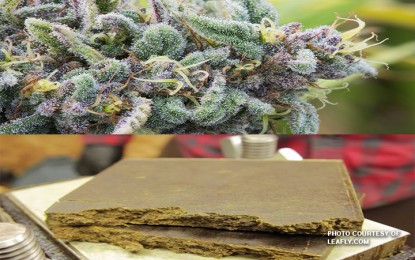
MANILA -- For the first time, the Philippine Drug Enforcement Agency (PDEA) seized hybrid marijuana known as kush and hashish from the Indian national and his cohort, who were nabbed during an entrapment operation in Muntinlupa City last week.
“This is the first time that PDEA seized these types of drugs after the arrest of an Indian national and another person in an exclusive subdivision in Alabang, Muntinlupa City,” PDEA Director General Aaron Aquino said in a statement on Thursday.
Kush is a variety of hybrid marijuana that originated in South Asian countries and also cultivated in Afghanistan, India, and Pakistan.
Unlike the common cannabis plants propagated in the country, kush is a dwarf type of marijuana plant, making it more untraceable for authorities. In the Philippines, it is found in Kalinga and Sagada.
The proliferation of kush started in Europe prior to its cultivation in Kalinga. The price varies from 20 to 25 euros (PHP1,230 to PHP1,530) per gram. In the Philippines, it is sold from PHP1 million to PHP1.5 million per kilogram.
“Kush undergoes a process called ice process, manual and mechanical process to produce a chocolate like result,” Aquino said.
Hashish is an extract of cannabis plant containing concentrated psychoactive resins. The price of hashish varies from PHP20,000 to PHP25,000 per gram.
These types of drugs have the same effects as common marijuana, like euphoria, prolonged feeling of being hungry, increase heart rate, anxiety, panic attacks, and always in deep thought. But their effects are heavier and more potent.
The cannabis plant, which is the main ingredient of kush and hashish, is transported from Kalinga to Sagada in Mountain Province, the pick-up point, before it is delivered to Quezon City. The cultivation of this type of marijuana is not limited to Kalinga. It is also cultivated in Mindanao.
Aquino said that drug personalities continue to develop these types of drugs, which are being sold to young professionals, college students, young celebrities, and children of prominent and affluent families including politicians using Transportation Network Vehicle Service or TNVS to evade authorities,” Aquino said.
The PDEA chief said these celebrities and politicians are subject of PDEA case build-ups, treating them as red flag personalities, considering that they have personal contact numbers with the arrested drug personalities. (PNA)
